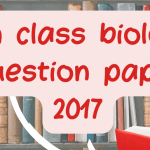Preparing for the RDVV B Ed exam requires a clear understanding of all subjects covered in the course. This guide provides questions and answers from different subjects, focusing on helping students grasp important concepts effectively. Each subject contains a variety of question types to ensure thorough preparation.
Philosophical and Sociological Foundations of Education
Question: What is the definition of education according to Mahatma Gandhi?
Answer: Education is the process of bringing out the best in man—body, mind, and spirit.
Question: What are the aims of education in a democratic society?
Answer: To promote individuality, creativity, social justice, and democratic values.
Question: Explain the concept of child-centric education.
Answer: Child-centric education focuses on the needs, interests, and potential of the child rather than a fixed curriculum.
Question: Define educational philosophy.
Answer: Educational philosophy is a set of ideas and beliefs about education that guide the teaching-learning process.
Question: What is naturalism in education?
Answer: Naturalism emphasizes learning through experiences and interactions with the natural world.
Question: What is pragmatism in education?
Answer: Pragmatism views education as a way to solve problems practically and prepares learners for real-life situations.
Question: Explain the role of teachers in progressive education.
Answer: Teachers act as facilitators, guiding students to explore and discover knowledge independently.
Question: What is the role of education in social change?
Answer: Education empowers individuals, reduces social inequalities, and fosters progressive societal changes.
Question: What are the main tenets of Gandhian education?
Answer: Emphasis on self-reliance, manual work, and integration of head, heart, and hand in learning.
Question: What is the meaning of educational sociology?
Answer: Educational sociology examines the relationship between society and education.
Question: What is the role of culture in education?
Answer: Culture influences values, norms, and practices that shape educational systems and individual learning.
Question: Define curriculum according to John Dewey.
Answer: Curriculum is a continuous reconstruction of experiences that stimulate further learning.
Question: What is the significance of co-curricular activities?
Answer: Co-curricular activities enhance personality development and practical learning.
Question: Explain the concept of inclusive education.
Answer: Inclusive education ensures equal learning opportunities for all, regardless of abilities or disabilities.
Question: What is social stratification?
Answer: Social stratification refers to the hierarchical arrangement of people in a society based on socioeconomic status.
Question: What is the role of education in eradicating gender inequality?
Answer: Education promotes gender awareness and empowers women by providing equal opportunities.
Question: What is the concept of social justice in education?
Answer: Social justice ensures fairness and equity in access, resources, and opportunities in education.
Question: How does education contribute to national development?
Answer: Education develops human capital, fosters innovation, and strengthens democratic institutions.
Question: Define lifelong learning.
Answer: Lifelong learning is the continuous pursuit of knowledge and skills throughout an individual’s life.
Psychology of Learning and Development
Question: What is learning according to psychologists?
Answer: Learning is a process of acquiring knowledge, skills, attitudes, or behaviors through experiences.
Question: What are the stages of cognitive development according to Piaget?
Answer: Sensorimotor, preoperational, concrete operational, and formal operational.
Question: Define classical conditioning.
Answer: Classical conditioning is a learning process where a neutral stimulus becomes associated with a response.
Question: What is operant conditioning?
Answer: Operant conditioning involves learning through reinforcement and punishment.
Question: What is the role of motivation in learning?
Answer: Motivation drives individuals to engage, persist, and achieve learning goals.
Question: Explain Maslow’s hierarchy of needs.
Answer: Maslow’s hierarchy outlines five levels of needs, starting from physiological to self-actualization.
Question: What is the significance of reinforcement in learning?
Answer: Reinforcement strengthens desired behaviors, making them more likely to recur.
Question: What are intrinsic and extrinsic motivations?
Answer: Intrinsic motivation comes from within, while extrinsic motivation is influenced by external rewards.
Question: Define intelligence according to Gardner.
Answer: Intelligence is the ability to solve problems or create products valued in one or more cultural settings.
Question: What are the types of memory?
Answer: Sensory memory, short-term memory, and long-term memory.
Question: Explain the concept of multiple intelligences.
Answer: Multiple intelligences refer to diverse forms of intellectual abilities, such as linguistic, logical, and spatial.
Question: What is emotional intelligence?
Answer: Emotional intelligence is the ability to recognize, manage, and use emotions effectively.
Question: Define observational learning.
Answer: Observational learning is acquiring knowledge and skills by observing others.
Question: What is the role of a teacher in facilitating learning?
Answer: A teacher provides guidance, resources, and a supportive environment to enhance student learning.
Question: What is the importance of assessment in education?
Answer: Assessment measures learning progress, identifies gaps, and improves teaching strategies.
Question: Define personality development.
Answer: Personality development involves enhancing an individual’s emotional, intellectual, and social traits.
Question: What is the difference between growth and development?
Answer: Growth refers to physical changes, while development encompasses holistic changes in skills and abilities.
Question: How does play influence child development?
Answer: Play enhances creativity, social interaction, and cognitive skills in children.
Question: What is the significance of educational psychology?
Answer: Educational psychology helps understand learner behavior, improving teaching and learning outcomes.
Teaching and Learning Strategies
Question: What is the lecture method of teaching?
Answer: The lecture method involves delivering content verbally to a group of students.
Question: What are the advantages of group discussions in learning?
Answer: Group discussions enhance critical thinking, communication skills, and collaboration.
Question: Define experiential learning.
Answer: Experiential learning is learning through direct experience and reflection.
Question: What is the project method of teaching?
Answer: The project method involves students working on real-world problems collaboratively.
Question: What is peer teaching?
Answer: Peer teaching is a process where students teach their peers under teacher guidance.
Question: What is the role of technology in modern teaching?
Answer: Technology enhances learning through digital tools, interactive content, and online resources.
Question: What is micro-teaching?
Answer: Micro-teaching is a training technique for teachers to practice specific skills in a controlled setting.
Question: Define blended learning.
Answer: Blended learning combines traditional classroom teaching with online learning.
Question: What are flipped classrooms?
Answer: Flipped classrooms involve students learning content at home and engaging in activities in class.
Question: What is cooperative learning?
Answer: Cooperative learning is a teaching strategy where students work together to achieve learning goals.
Question: Explain the role of assessment in teaching.
Answer: Assessment evaluates student learning, informs teaching practices, and identifies areas for improvement.
Question: What is the inquiry-based learning approach?
Answer: Inquiry-based learning encourages students to ask questions, investigate, and build knowledge actively.
Question: What is constructivist teaching?
Answer: Constructivist teaching focuses on building knowledge through active participation and exploration.
Question: Define scaffolding in education.
Answer: Scaffolding involves providing temporary support to learners, gradually withdrawing it as they gain independence.
Question: What are open-ended questions in teaching?
Answer: Open-ended questions encourage critical thinking and allow diverse responses from students.
Question: How does classroom management affect learning?
Answer: Effective classroom management creates a conducive environment for learning and discipline.
Question: What is the role of feedback in teaching?
Answer: Feedback provides constructive input to improve student performance and learning outcomes.
Question: Define differentiated instruction.
Answer: Differentiated instruction tailors teaching methods to meet diverse learner needs.
Question: What is active learning?
Answer: Active learning engages students in meaningful activities, promoting critical thinking and deeper understanding.
Concluding on a positive note, mastering RDVV B Ed question papers requires understanding subject fundamentals and applying effective study techniques. Regular practice and exploration of different types of questions improve confidence and knowledge.
Latest Posts
- Step-by-step guide to download and apply for jee mains admit card 202
- Comprehensive 2025 government holidays and recruitment details for job seekers
- JEE Mains Admit Card 2025: Your Step-by-Step Guide to Downloading the Hall Ticket
- Everything You Need to Know About 2025 Government Holidays Recruitment
- Comprehensive Guide to rrb d group recruitment 2025 – Eligibility, Vacancies, and Application
- Detailed guide to nps trust recruitment 2025 vacancies, eligibility and apply process
- Comprehensive guide to hpcl recruitment 2025 notification, vacancies, and application process
- ignou bed admission 2025 complete recruitment guide with eligibility and process
- Comprehensive Guide to Indian Army Agniveer Recruitment 2025 Notification and Jobs
- Everything You Must Know About CBSE Board Exams 2025 Changes & New Rules





